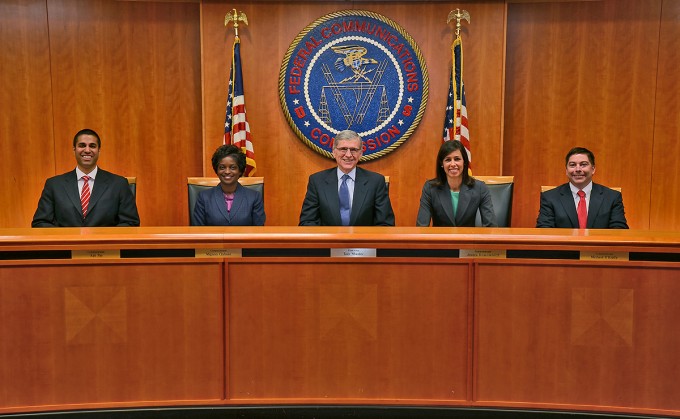- Qualcomm Launches Snapdragon 4 Gen 2 Mobile Platform
- AMD Launches Ryzen PRO 7000 Series Mobile & Desktop Platform
- Intel Launches Sleek Single-Slot Arc Pro A60 Workstation Graphics Card
- NVIDIA Announces Latest Ada Lovelace Additions: GeForce RTX 4060 Ti & RTX 4060
- Maxon Redshift With AMD Radeon GPU Rendering Support Now Available
FCC Moves One Step Closer in Killing Off Net Neutrality
The FCC has today succeeded in passing a vote to advance the process of instating net neutrality rules. On paper, that sounds like a good thing. In reality, it could lead to a vastly changed Internet.
Tom Wheeler, FCC’s Chairman, claims to be in full support of an open Internet, but with his agency’s net neutrality rules, ISPs would gain the ability to charge certain businesses more for their traffic than others. That’s not what I’d consider “open”. Companies like Netflix and Hulu could be charged more simply because they’re high-bandwidth customers.
To give an example of how absurd this is, a regular Joe could download 2TB worth of torrent data in a single month, and his ISP wouldn’t flinch. Joe’s ISP offers him “unlimited” bandwidth, after all. But Joe also streams about 20GB worth of Netflix a month, and the ISP realizes that while it can’t charge extra for torrent data, it could on something substantial like Netflix. Said ISP then uses that as an example, or an excuse, to charge Netflix more.

The people in charge of net neutrality’s fate in the US
That could make it sound like Joe should be the one being charged more, but that’s not the case. The Internet should be “open”. People subscribe to an Internet service, and as long as it’s not abused, no one should have a problem. This is an area where even smaller ISPs might run into trouble. Typically, smaller ISPs can offer customers more attractive packages, because they’re more willing to bend over backwards for business. But many of these run through larger ISPs which might decide to throttle services like Netflix. That could trickle down to the smaller guys, forcing them to charge more as well (since they’d be paying more to the ISP they feed through).
Clearly, this is a very sticky situation. Bandwidth is not rare, and ISPs certainly make a pretty penny on even the heaviest of Internet users. So to want to charge a business more just because their content is more attractive, or popular in the grand scheme, is absurd. This kind of thing is something no business should have to concern themselves over. The Internet should be open, plain and simple.
In his statement after the vote, FCC Commissioner Michael O’Rielly hits the nail on the head:
It should come as no surprise that I cannot support today’s Notice. As I’ve said before, the premise for imposing net neutrality rules is fundamentally flawed and rests on a faulty foundation of make-believe statutory authority. I have serious concerns that this ill-advised item will create damaging uncertainty and head the Commission down a slippery slope of regulation.
He further states:
In sum, the proposed net neutrality rules and legal theories will stifle innovation and investment by the private sector, provide no help to consumers, and thrust the Commission into a place it shouldn’t be. I respectfully dissent.
Further votes will be needed to see the FCC’s net neutrality rules become firm, with a final judgement to be made later this year.




